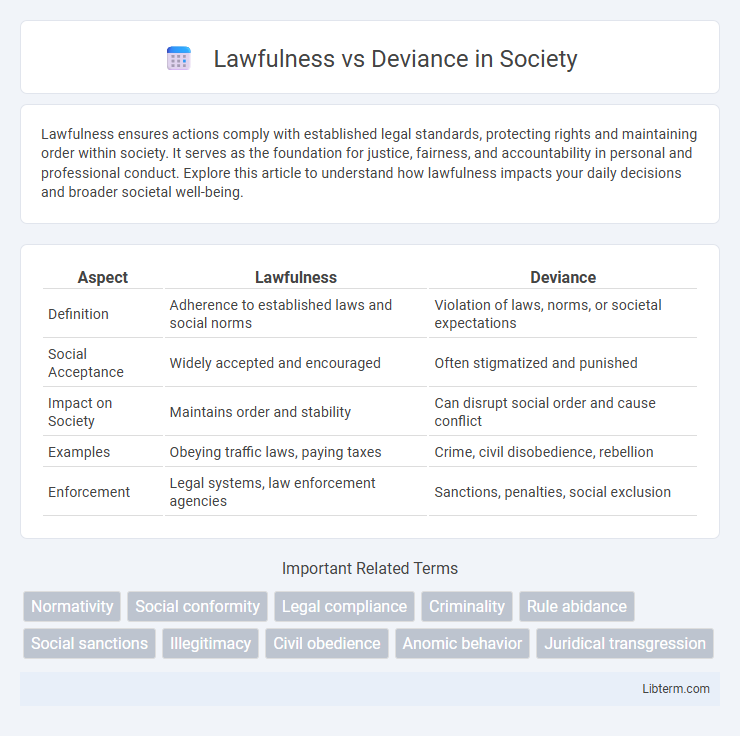Lawfulness ensures actions comply with established legal standards, protecting rights and maintaining order within society. It serves as the foundation for justice, fairness, and accountability in personal and professional conduct. Explore this article to understand how lawfulness impacts your daily decisions and broader societal well-being.
Table of Comparison
| Aspect | Lawfulness | Deviance |
|---|---|---|
| Definition | Adherence to established laws and social norms | Violation of laws, norms, or societal expectations |
| Social Acceptance | Widely accepted and encouraged | Often stigmatized and punished |
| Impact on Society | Maintains order and stability | Can disrupt social order and cause conflict |
| Examples | Obeying traffic laws, paying taxes | Crime, civil disobedience, rebellion |
| Enforcement | Legal systems, law enforcement agencies | Sanctions, penalties, social exclusion |
Defining Lawfulness and Deviance
Lawfulness refers to behaviors that conform to established legal norms and regulations enforced by governing authorities. Deviance encompasses actions that violate social or legal standards, challenging accepted norms and often prompting social sanctions. Understanding the distinction between lawfulness and deviance is essential for analyzing social control mechanisms and maintaining societal order.
Historical Perspectives on Law and Social Norms
Historical perspectives on law and social norms reveal that lawfulness is often established through codified rules reflecting societal values, while deviance represents behaviors challenging or violating these accepted norms. Throughout history, legal systems have evolved from customary practices to formal statutes to regulate conduct and maintain social order. Deviant behaviors have frequently prompted legal reforms or reinforced societal boundaries by highlighting conflicts between established norms and emerging social changes.
Factors Influencing Lawful Behavior
Social norms, cultural values, and upbringing play crucial roles in shaping lawful behavior by reinforcing the internalization of rules and acceptable conduct. Psychological factors such as moral reasoning, empathy, and cognitive development influence an individual's tendency to comply with laws rather than engage in deviant acts. Environmental conditions including peer pressure, socioeconomic status, and law enforcement presence further impact the likelihood of lawful versus deviant behavior.
Roots and Motivations Behind Deviance
Deviance stems from complex social, psychological, and economic roots that challenge established norms and laws. Motivations behind deviant behavior often include social strain, lack of opportunity, rebellion against authority, or subcultural values promoting alternative norms. Understanding these underlying causes is essential for effective law enforcement, social policy, and rehabilitation efforts.
Societal Reactions to Lawfulness and Deviance
Societal reactions to lawfulness typically involve reinforcement through social approval, legal rewards, and integration into community norms, promoting stability and order. In contrast, deviance triggers sanctions ranging from informal disapproval to formal legal penalties, reflecting society's efforts to maintain boundaries and discourage disruptive behaviors. These reactions shape individual behavior and collective values, highlighting the dynamic relationship between social control mechanisms and normative conformity.
The Role of Culture in Shaping Norms
Culture profoundly influences the definition and enforcement of lawfulness versus deviance by establishing shared norms and values that guide acceptable behavior within a society. Norms rooted in cultural traditions, beliefs, and social practices determine what is considered lawful or deviant, shaping legal systems and social control mechanisms accordingly. Cultural diversity leads to varying interpretations of deviance, highlighting the role of cultural context in defining and regulating social order.
Legal Consequences of Deviance
Deviance that violates legal standards triggers specific legal consequences, including fines, imprisonment, or community service, aimed at maintaining social order. Law enforcement agencies and judicial systems play a critical role in identifying, prosecuting, and penalizing deviant behaviors to ensure compliance with established laws. Such legal sanctions not only deter future violations but also reinforce societal norms and values.
Law Enforcement and Social Control
Law enforcement agencies play a critical role in distinguishing lawfulness from deviance by enforcing legal norms and maintaining social order through surveillance, policing, and judicial processes. Social control mechanisms, including formal sanctions and informal community pressures, work together to discourage deviant behavior and promote compliance with societal laws. Effective collaboration between law enforcement and social institutions ensures the reinforcement of legal standards and mitigates challenges posed by deviant actions.
Pathways to Reintegration and Reform
Pathways to reintegration and reform emphasize structured support systems, such as education, vocational training, and community-based programs, to guide individuals from deviant behavior back to lawfulness. Evidence-based interventions targeting cognitive restructuring and social skill development help reduce recidivism rates and promote prosocial behavior. Effective reintegration relies on collaboration between criminal justice agencies, social services, and community organizations to foster sustainable reform and social inclusion.
Balancing Lawfulness and Social Change
Balancing lawfulness and social change requires recognizing that laws must evolve alongside societal values to maintain legitimacy and order. Social movements often challenge existing legal frameworks, prompting reforms that reflect emerging norms and justice. Effective governance integrates legal stability with flexibility to accommodate progressive change without descending into deviance.
Lawfulness Infographic

 libterm.com
libterm.com